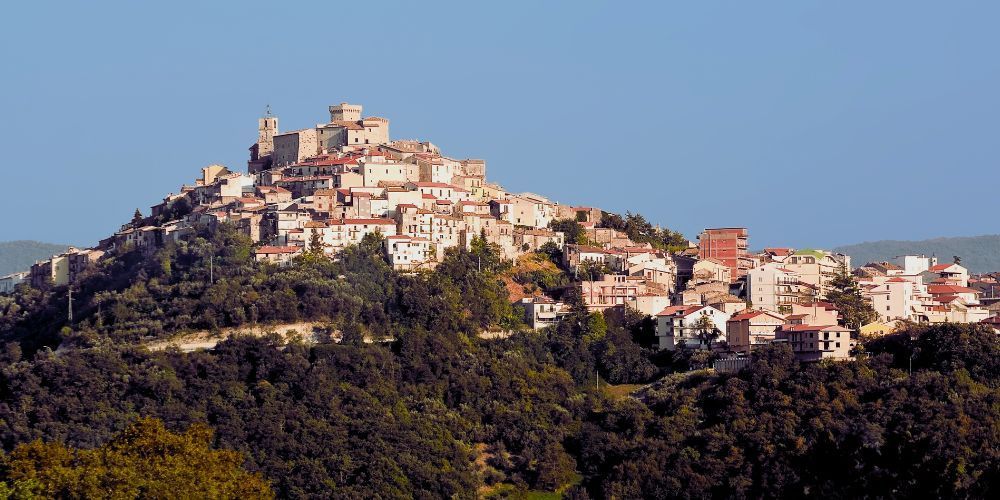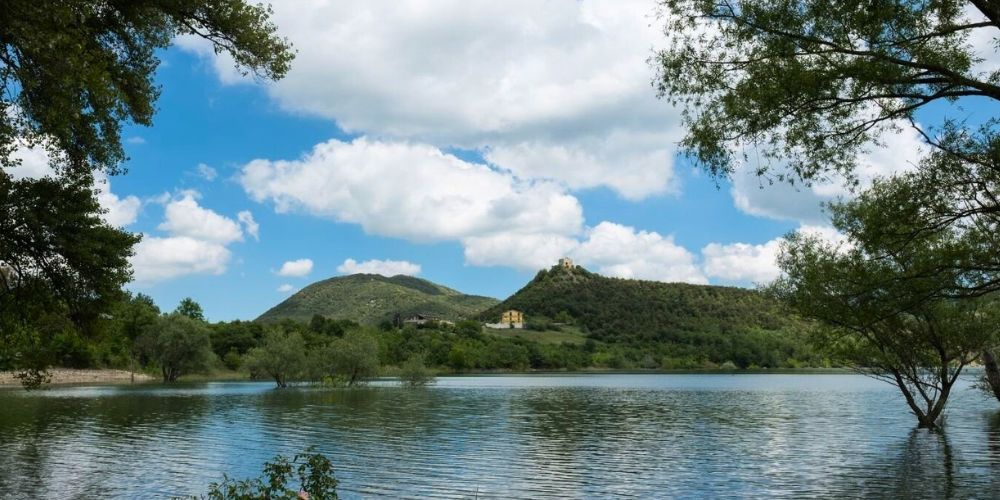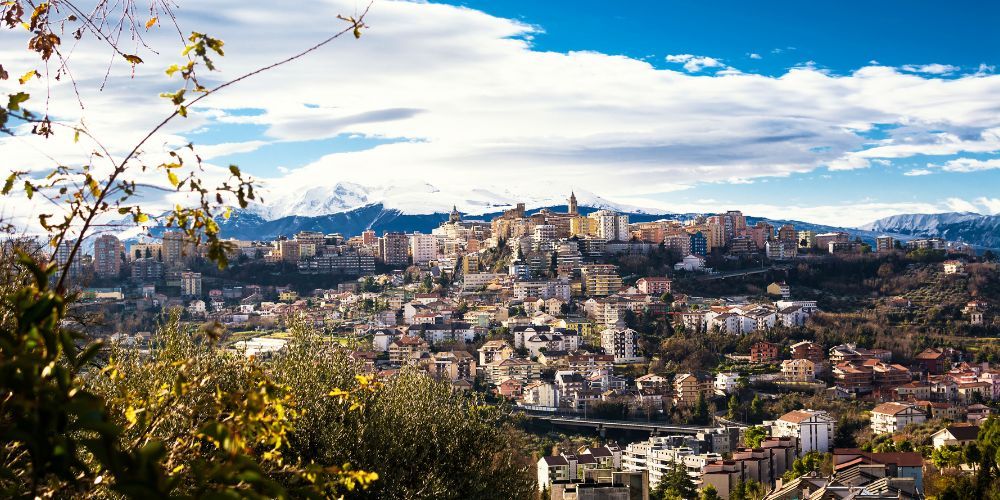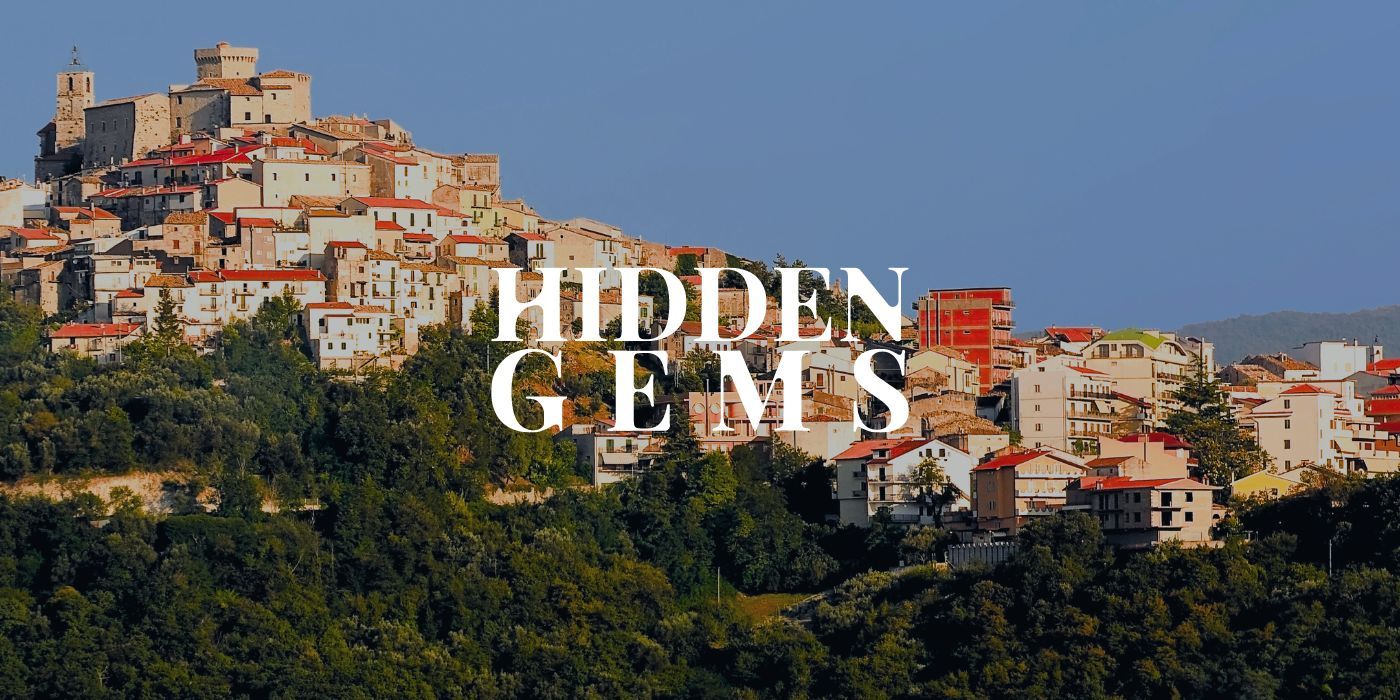Our journey exploring the most beautiful gems to visit in Italy takes us to Abruzzo once again, the enchanting Europe’s green region, a land where the mountains embrace the sea capable of welcoming and pampering tourists among ancient cities and stunning villages.
Speaking of villages, today let's discover together what to see in Casoli, one of the most historic, beautiful and iconic places set in the landscape of Maiella, also known as the olive oil town and as an important tourist destination for a slow holiday searching for relax among its ancient alleys and the nearby lakes Sant'Angelo and Serranella. Ready? So let's set off right away, destination Casoli!

Casoli: where it is and how to get there
Before checking out what to see in Casoli, it's necessary to set off on our trip understanding where it is and how to get there.
Casoli is a village counting around 5000 inhabitants in the province of Chieti, perched on the top of a hill approximately 380 meters above sea level east of Maiella, in the southern area of Abruzzo. Its territory is characterized by a beautiful rural landscape made of cultivated lands - in particular olive trees - and green hills, embellished not only by the massive presence of one of the largest mountains in Italy, but also by the flow of the rivers Aventino and Sangro and from the lakes Sant'Angelo and Serranella.
The only useful means of transport to visit Casoli is the car, or possibly small private tourist buses. To get to Casoli from Chieti it is necessary to drive on the SS81 towards south, following the signs to reach the village near the junction with the SS84 (about 40 km, 45 minutes). Starting from Pescara the route is the same, but first you will have to follow the highway junction Chieti-Pescara and the SS656 up to Chieti, then continuing on the SS81 up to Casoli (approximately 60 km, 1 hour).
Being in central-southern Italy, one of the most important logistics hubs from a tourist point of view is certainly Rome. It is possible to reach Casoli starting from the Capital quite easily, driving on the A24 and A25 highway and then on the SS81 until you get to your destination (around 230 km, 3 hours).
Are you planning to visit Rome too? Click the button below to check out Visit Rome Pass, the most comfortable and convenient way to best experience the Eternal City, the ideal solution for a weekend or a whole week!
Book now your Visit Rome PassThe history of Casoli from its origins to reconstruction
The time has come to discover more about the rich history of Casoli. The first official origins of the village take us back to the first half of the middle age, when this small isolated place among the hills was chosen as a place of retreat by many communities of monks, in particular for its tranquility and distance from the hectic life of the larger settlements, constantly growing.
Some excavations carried out near Casoli, however, have suggested that it was probably founded already in Roman age, bringing to light the remains of aqueducts, amphitheaters and other typically Roman buildings near the location of Piano Laroma. This is ancient Cluviae, the first historic settlement in the territory of nowadays Casoli.
Becoming a place of observation and control throughout the middle age, as made clear by the remains of the towers scattered in several strategic points over the territory, Casoli reached the top of its development in the centuries between the renaissance and the modern age, representing at the beginning of 1900s an important point of social and cultural development. This momentum was supported above all by Pasquale Masciantonio, a prominent politician of the Kingdom of Italy coming from the oil town, who dreamed of transforming his hometown into an increasingly accessible place both from a physical and ideological point of view.
An ambition that unfortunately was not possible to cultivate as hoped due to the wars that tore Italy apart, in particular the Second World War, one of the darkest pages in the history of Casoli made of bombings and destruction, but also of great courage shown by the heroes of the partisan force 'Brigata Maiella' in the fight for liberation.
Much of Casoli was destroyed during the war. However, thanks to an exceptional reconstruction work that took into account the original aesthetics of the town, the olive oil town in Abruzzo managed to achieve an urban, social and economic relaunch, preserving the evidence of its fascinating origins.
What to see in Casoli on your trip to Abruzzo

And here we are, finally ready to discover what to see in Casoli and visit this fantastic corner of Abruzzo, framed as a true landscape masterpiece in the splendid panorama of Maiella and the valleys of rivers Aventino and Sangro!
Wandering through the alleys of Casoli, in particular moving upwards to the highest point of the historic centre, you will be able to explore picturesque squares and crossroads, among narrow streets, stairways and facades of ancient houses decorated with flowers, plants and beautiful murals. In Casoli there are also many elegant and evocative historic buildings dating back to 1700s and 1800s, such as Palazzo De Vincentiis, Palazzo Tilli, Palazzo De Cinque and Palazzo Ricci, as well as several interesting renaissance, baroque and neoclassical churches.
On the top of Casoli the profiles of the Masciantonio Castle and the Church of Santa Maria Maggiore have stood out for centuries, the two undisputed icons of the olive oil town, absolutely essential for a fantastic postcard from the gem of Maiella!
What to see in Casoli: “Reborn”, a promo for rebirth
Like many other villages in Abruzzo, the history of Casoli tells about tradition, culture and growth as well, but above all of rebirth even after the darkest hour of the war.
Thanks to an important and arduous project to revamp the historic centre of Casoli, which began with the reconstruction of the town after the war and continued in all these years also from a tourist point of view, this location in Abruzzo today is a destination of marked historical and artistic interest that attracts many visitors interested in the world of green tourism.
It is therefore not surprising that in 2023 Casoli was included in the top 10 of the most beautiful villages to visit across our splendid peninsula!
To represent and promote the complete historical, cultural and economic rebirth of Casoli and make it even more spectacular, director Walter Nanni dedicated a moving and passionate promo to the gem of Maiella entitled "Reborn", created in collaboration with Media Dream Film.
On the top of Casoli: Masciantonio Castle and Church of Santa Maria Maggiore
When you think about what to see in Casoli on a nice trip near Maiella, the must-see stages to visit in its historic centre are Masciantonio Castle and the Church of Santa Maria Maggiore, on the highest and most panoramic point.
Masciantonio Castle, also simply known as Ducal Castle, is a building of great historical-cultural interest that developed around the ancient medieval watching tower, built around the year 1000. The actual castle, as it appears today, was built starting from the renaissance, and throughout the modern era up to 1800s, increasingly expanding the original tower with the creation of an elegant noble palace next to the tower for residential purposes.
Today the castle of Casoli is the symbol of the town and an important place of culture for museum and artistic exhibitions dedicated to the history of the area, in particular the Wigram Chamber (named after the English officer who supported the heroic Brigata Maiella) where you can find out more on how the Second World War was experienced in Abruzzo, and the stories of those who stayed within its walls, in particular the iconic poet Gabriele D'Annunzio to whom an entire room is dedicated.
Right next to the castle there is also the Church of Santa Maria Maggiore, originally built as a small chapel with a single nave within 1400s and subsequently enlarged between the 1600s and 1700s. Despite the numerous restorations made necessary after the damage caused to the building by bad weather and especially by a few earthquakes, today this church maintains its recognizable original renaissance-baroque aesthetic. Inside there are several sculptures of saints and numerous sacred ornaments, in particular a beautiful painting of the Madonna del Rosario dated 1572, of which, however, the identity of the author is unknown.
If you want to visit other interesting churches in Casoli, we recommend the Church of Santa Reparata and the Church of San Rocco. The first comes from renaissance and is dedicated to the Patron Saint of Casoli, celebrated in summer for three days, and is characterized by the contrast between ancient and contemporary architectural elements due to the reconstruction of a large part of the building after the war; inside there's a suggestive statue of Santa Reparata dating back to 1700s. The second one, in neoclassical style, is worth visiting for its surprising baroque decorations.
The lakes Sant'Angelo and Serranella near Casoli

Lake Sant'Angelo is certainly worth visiting, mong the most interesting natural beauties to see near Casoli. It is an artificial lake created at the end of the 1950s by damming the crystal clear waters of the river Aventino, a human intervention which created a freshwater basin perfectly integrated into its landscape context anyway.
Immersed in a valley surrounded by greenery and the suggestive view of the Maiella, where it is also possible to admire the remains of the ancient Tower of Prata, the lake is partially accessible and is the perfect location to enjoy the beautiful sunny days in spring and summer.
Also not to be missed is the splendid WWF Oasis of Lake Serranella, another little corner of tranquility set in a majestic landscape in which to venture out while exploring the pure nature of the area among many itineraries, hikes and outdoor activities for adults and children. If you enjoy this topic, please check out our complete guide on lake vacations in Italy!
Casoli, the oil town: discovering precious olive trees in Abruzzo
Casoli, not surprisingly the olive oil town, is famous for the renowned dedication to olive growing throughout its territory. Among the numerous varieties of olives produced in the area, the best known and most appreciated is the Intosso olive, from which derives the local production of the namesake extra virgin olive oil, a true gastronomic jewel of Abruzzo recognized as a Slow Food Defense. This curious name comes from the Abruzzo dialect 'ndossa, which is a procedure that sweetens the typically bitter flavor of these olives before being eaten.
Cultivated for centuries on the hills of Maiella, this native cultivar stands out for its medium-large fruit and leathery skin. From these fruits comes the production of a particular extra virgin olive oil with a strong and inimitable flavor, an iconic condiment in Abruzzo cuisine perfect to combine with meat, grilled vegetables and cheeses, which stands out for its intense green color and its inebriating scents of artichoke, almond, tomato, pepper and walnut.
Visiting Casoli and trying its amazing olive oil means discovering a delicious and excellent product that embodies the history and tradition of a truly unique territory and the passion of local producers.
What to see near Casoli while exploring Abruzzo

Our journey discovering the evocative olive oil town at the foot of Maiella ends here, but your adventure across the extraordinary beauties of Abruzzo is still full of fantastic experiences awaiting you!
On the opposite side of the mountains, towards the west inland, we recommend visiting some of the most iconic and picturesque villages in the region, absolutely wow if you love immersing yourself in nature. Any examples? Take a look at our guides dedicated to Opi, the adorable village of Marsica; to Villetta Barrea, the incredible village of deers overlooking the namesake lake; or to Villalago and Scanno, two little gems that embrace the romantic and famous heart-shaped lake.
Anyway, if you prefer to venture out discovering the larger cities, further north of Casoli you can stop by and explore the beautiful Chieti, a city of art where you can visit the wonderful Marrucino Theatre, the Barbella Art Museum and the Cathedral of San Giustino. We recommend you also go to L'Aquila, the historic city symbol of Abruzzo and Italian Capital of Culture 2026!
How about an exciting jeep tour through the vineyards of a historic winery? Of course, all this is possible in Roseto degli Abruzzi! Click below to find out how to join this original, fun and above all good experience at one of the most renowned producers in Abruzzo and tasting their most delicious specialities!
Book now your jeep tour with food and wine tastingAbout the author
Written on 24/04/2024



Sabrina Fabozzi
Traveling to Abruzzo? Check out with us what to see in Casoli, the gem of Maiella known as the olive oil town overlooking the lake Sant'Angelo.